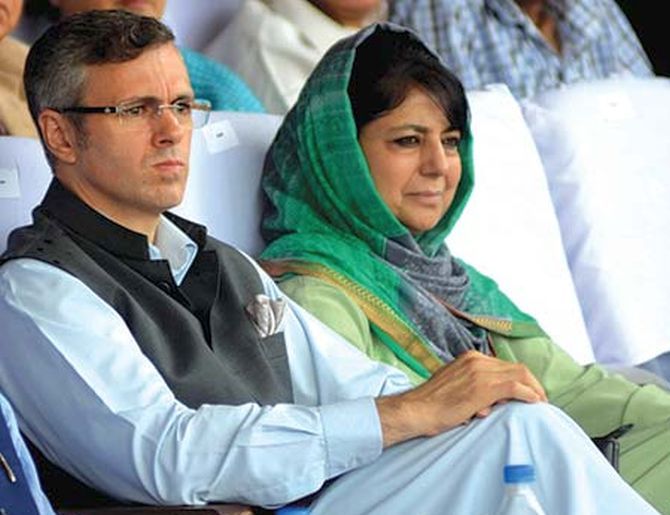 | « Back to article | Print this article |
'Although the tactical move to outflank the BJP fell through with New Delhi's decisive intervention and eventual dissolution of the state assembly, the PDP, NC and the Congress appeared to be more than satisfied.'
'They see the assembly dissolution as their 'great achievement'.'
'If one were to believe what they say, this was also their main objective,' reveals Mohammad Sayeed Malik, the doyen of Kashmiri commentators.

For once -- just once -- in Kashmir history, it was the tail that wagged the proverbial dog to re-set the balance of forces on the state's notoriously murky political ground.
Governor Satya Pal Malik was left with a Hobson's choice, on Wednesday, November 21, after an unlikely reconfiguration of political forces in Jammu and Kashmir leveled the ground for transfer of power from the BJP-ruled 'New Delhi' to a Valley-centric combination of mutually antagonistic groups, comprising the Peoples Democratic Party, the National Conference and the Congress.
If the headcount on the floor of the 87-member state assembly were allowed to take place the conclusion was foregone: The PDP-Congress alliance backed by the NC would sail through comfortably.
Definitive Arithmetic, however, has never mattered in J&K even when the law, morality and the Constitution warranted it. On the contrary, vaguely defined 'national interest' ultimately trumps it all and eventually wins the hand for whosoever happens to be in power at the Centre.
Right from August 1953 when the then prime minister Sheikh Abdullah, enjoying total support in the state assembly, was unceremoniously 'dismissed' and put behind bars to November 21, 2018 when a numerically viable combination was summarily barred, at the threshold, from filling up the vacuum caused by the abrupt termination of the BJP-supported Mehbooba Mufti-led coalition earlier in June, it has been a one-sided story.
The BJP's abrupt withdrawal of support to the PDP-led coalition halfway through its 6-year tenure morally warranted simultaneous dissolution of the fractured state assembly.
For reasons not definitely known, neither Mehbooba exercised her Constitutional prerogative to recommend immediate dissolution of the House nor did the then governor N N Vohra suggest it to New Delhi.
Legislators's loyalties came under increasing strain with unlikely claimants to power jumping into the forefront and throwing open counters to buy loyalties.
Precisely, BJP ally Sajad Lone's Peoples Conference let the impression grow that he had the New Delhi's 'blessings' to go ahead, obviously with the support of the BJP's 25-member group of MLAs.
These rumours gained currency after the recent civic elecions in which the voter turnout was uneven with a huge chunk of the electorate in the valley boycotting it.
It was reliably learnt that Lone's side had so far succeeded in poaching about a dozen MLAs, mainly from the dissent-riddled PDP but a couple or so each also from the NC and the Congress.
The rival side viewed as the BJP's proxy bid to recapture power and rule the state again at least until the next parliamentary election.
Alarm bells rang across the board and traditional rivalries momentarily receded into the background. The top leadership of the PDP, NC and the Congress swung into action from Srinagar to New Delhi.
It is reliably learnt that Ghulam Nabi Azad was not kept in the loop by his Congress party for whatever reason. Instead, Ambika Soni was drafted for the task.
Locally, Omar and Mehbooba got in touch and both took advice from Dr Farooq Abdullah.
The NC and the Congress offered the leadership of the legislative combination to the PDP whose former minister Altaf Bukhari emerged as the consensus choice.
PDP MP Muzaffar Hussain Baig was angry at being skipped over and went public with his wrath against Mehbooba and support and sympathy for Sajad Lone.
The rest is history.
Although this tactical move to outflank the BJP fell through with New Delhi's decisive intervention and eventual dissolution of the state assembly, the PDP, NC and the Congress appeared to be more than satisfied.
They see the assembly dissolution as their 'great achievement'. If one were to believe what they say, this was also their main objective.
In the rumour-prone Kashmir valley, poaching of MLAs with the BJP's tacit support was creating uncertainty and sort of political scare in the ranks of the other parties, notably the PDP.
Had the PDP, NC and Congress combination come into power, the contraption would have been born with a couple of congenital deformities: It would have had a 'Muslim face' and a 'Kashmir valley face' that would make it unacceptable to the Hindu-majority Jammu and Buddhist populated Ladakh regions.
Also, its numerical viability could not be guaranteed forever, given that as it is, hunting ground for all the three remains the Kashmir valley. Each survives virtually at the expense of the other.
That they were able to get together even momentarily and extract a significant political advantage out of the BJP is no mean achievement for them all.
The PDP has been able to wash away a part of the 'ideological stink' by confronting its erstwhile ally, the BJP; the NC was craving for early dissolution of the assembly and that has been achieved without any cost; the Congress has got itself back into the reckoning after having been pulverised by the BJP in Jammu in the 2014 assembly and Parliamentary elections.
The scenario after the 'event' suggests that governor's rule is most likely to be converted into President's Rule mid-December. That would enable holding of simultaneous elections to the state assembly and the Lok Sabha in 2019. The Jammu and Kashmir constitution mandates assembly polls within six months of dissolution of the House.